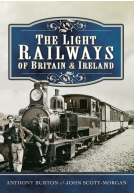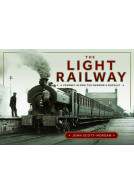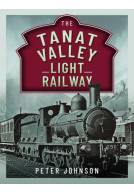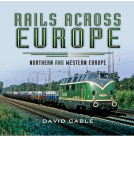The East Kent Railway (ePub)
The Line That Ran to Nowhere
Imprint: Pen & Sword Transport
Series: Light Railway Profiles
File Size: 24.1 MB (.epub)
Illustrations: 180 illustrations
ISBN: 9781526726865
Published: 5th May 2021
| Other formats available - Buy the Hardback and get the eBook for £1.99! | Price |
|---|---|
| The East Kent Railway Hardback Add to Basket | £20.00 |
The East Kent Railway was one of Britain's less well known light railways. A part of the Colonel Stephens group of lines, the East Kent Railway was meant to open up the newly discovered Kent coal field and help to make its shareholders wealthy. However, things took a different turn when the projected collieries along the line did not materialise the way the promoters had first envisaged.
The only colliery to produce quantities of coal was Tilmanstone, near Shepherdswell, which opened in 1912. Other pits were started along the formation of the line from Shepherdswell to Wingham, but in these cases only the surface buildings or test shafts were constructed before the work was abandoned. This was largely due to flooding and the poor calorific quality of East Kent coal, which had to be mixed with other coal to be effectively used.
There were four collieries completed in Kent, the East Kent Railway only served one of them and this together with the other three lasted until the latter part of the 20th century.
The railway operated a loss making passenger service to Wingham and for a few years to Sandwich Road halt on the line to Richborough Port line. However, the service to Wingham Canterbury Road came to an end in October 1948, after British Railways had taken control.
The East Kent Railway lasted through two world wars and was nationalised in 1948, becoming part of the Southern Region of British Railways, before closing to traffic in 1984 during the coal strike.
The quality and number of photographs are remarkable considering that this was a mainly freight line with a relatively short and low profile history.
Paul Weeden, Great Eastern Railway Society
A very interesting and comprehensive record of this Colonel Stevens Light Railway.
A good pictorial appreciation of one of the country’s lesser-known railways, covering the entire life of the line through to the present day preserved section of the line.
Rail Advent
Read the full review here
"The book begins with an introduction and two short sections on the Kent coalfield and on how the light railway became the EKR followed by brief history of the line including a map and a piece by Graeme Gleaves on the EKR preservation years. The rest of the book consists of excellent photographs, mostly one per page, with informative captions covering the main line and branches, the stations and collieries, the locomotives and rolling stock. This is probably the largest published collection of EKR photographs; therefore I can thoroughly recommend this book."
The Railway Observer, Volume 92, April 2022
Featured in
The Ashover LIght Raiway Members Magazine - No.61
"While you may have wished that you had travelled on this line before closure, this book will go a long way to making you feel you have."
WC&P Railway Group Newsletter - March 2022
"Some readers may have copies of the Middleton Press book on the railway published in 1989. One prime difference between the books is the latest is targeted at being a high quality album rather than to the Middleton Press formula. The quality of the photos amply displays the primitive state of the infrastructure and rolling stock."
Alan de Burton, The Journal of the Friends of the National Railway Museum Winter 2021-2022
"This book is recommended as an extensive photographic record of this outpost of the Colonel Stephens’ empire."
Martin Shill, Industrial Railway Society
"This book is highly recommended and should find a place on the bookshelves of all lovers of Britain’s light railways."
West Somerset Railway Association
"Your reviewer visited the EKR on one occasion, when it was still hauling coal, and has always had a great liking for minor railways, particularly the Colonel Stephens lines. Thus, he enjoyed this book and would recommend it to anyone with similar railway interests and tastes."
Ffestiniog Railway Magazine, Winter 2021-22
"This largely pictorial volume is a pleasant browse."
The Society of Model and Experimental Engineers Journal - December 21
"A good reference work for modellers and useful to the very general reader. It is nevertheless welcome as a rare addition to the East Kent Railway’s rather limited canon."
Tenterden Terrier (Col. Stephens Railway Museum)
"The author’s good personal knowledge of the route and conversations with former employees are put to good use in the captions to images garnered from wide variety of well-known photographers."
Steam World, December 2021
Featured in
RVR-The Phoenix No 97 Autumn 2021
Featured in
Rother Valley Railway members magazine - Autumn 2021
Scott-Morgan’s latest description is refreshing and a pleasure to indulge, allowing the reader to follow more clearly the details of its short history in the early 1900s to closure and current success as a partly preserved railway at the present day.
Tenterden Terrier
The book’s greatest achievement is undoubtedly the inclusion of many photographs and detailed descriptions. About half of those shown have not been published before so will provide a renewed source of interest to followers of Colonel Stephens’ Railways.
"Exploring a classic railway".
Heritage Railway Magazine
This book will take you back to the sometimes busy, often chaotic and grimy days of the line that oozed Colonel Stephens' character.
Featured in
Branch Line News members magazine. Issue No: 1382 dated 7th August 2021
"This great book is jammed pack with superb photos."
The Colonel Stephens Magazine no 144
Featured in
East Kent Railway News Issue No 133
This isn't trying to be a definitive work on the history of this fascinating railway, but rather provide a good overview through well presented and informatively captioned pictures, and it does that very well. It's an easy book to read or just flick through, enjoying the photos and learning about the quaint and minimalist railway that once ran through a quiet corner of Kent.
Michael's Model Railways
Read the full review here
The new series of ‘Light Railway Profiles’ from Pen and Sword starts with a brief history of this interesting railway which mainly covered the Kent coalfields in the eastern part of the county and contains probably more photographs of the whole setup than there has ever been in one publication before. Highly recommended.
Peter Harding, Branch Line & Light Railway Publications
An interesting volume covering this forgotten railway. It provides a good overview with some nice black and white photographs that give a good flavour of the line
James Simmonds
About John Scott-Morgan
John Scott-Morgan has been writing about light railways for forty five years, he has written some of the definitive books on light railway subjects, including about the Colonel Stephens group of lines.
This volume covers the East Kent Railway, a line that was meant to open up the Kent Coal Field, which did not come up to the expectations of the promoters and investors.
John Scott-Morgan has written thirty eight books on railways over the last half a century, covering subjects as diverse as first generation diesel traction and main line subjects, such as the London Transport Red Panniers and Branch Lines in Kent, however its light railways that the author often returns to, as this is one of his main areas of research.
He lives in Woking in Surrey, where he continues with his writing and railway historical studies.




















